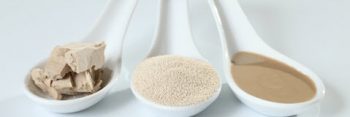
While it is not exactly clear when yeast was first used to bake bread, early records indicate that it came from Ancient Egypt. It is believed that flour mixed with water, and left on a warm day, fermented with the natural contaminants (wild yeast) in the flour giving rise to a lighter and tastier bread.
Centuries later, the power and magic of yeast remains the same, although the industry has developed through applied biotechnology and automation. Anchor Yeast has been a local producer of yeast in South Africa for close to 100 years, now with a state-of-the-art facility in Kwa-Zulu Natal.
Baker’s yeast production begins with a pure inoculum of Saccharomyces cerevisiae. It is then fermented in successive batches of increasing volume and biomass. Each fermentation stage is typically completed in 16 to 24 hours. Cream Yeast and Compressed Yeast fall under the fresh yeast category, requiring refrigeration. Dry Yeast, as we typically know it for home-baking, requires further dewatering and drying.
Yeast plays two key roles in baking; the first as a leavening agent, which allows the dough to rise create a more open and airy texture. The second, together with the gluten in the flour, is to add strength to the dough. Yeast also contributes to the taste, colour and the wonderful aroma of baked goods.
“Supply of yeast to the baking industry has progressively evolved over the years; a good example is the cream yeast units at large scale bakeries. These units are fully automated, adopting the latest technology, to consistently dose the required amount of yeast into the mixer. Furthermore, a high standard of quality and food safety is achieved,” commented Brett Tessendorf, National Sales Manager for Anchor Yeast.
Innovation in yeast production has also focused on the nutritional aspect. Our parent company, Lallemand, developed a process to produce a natural and vegetarian source of yeast enriched with vitamin D for baked products, and this was successfully launched to the South African baking industry a few years back.
Given the nature of live microorganisms, yeast production requires stringent quality control measures and adherence to food safety standards throughout the process; all of this contributes to the quality of your loaf of bread!
Anchor Yeast article published in Food & Beverage Reporter: FBR July Edition – Food & Beverage Reporter (fbreporter.co.za)

